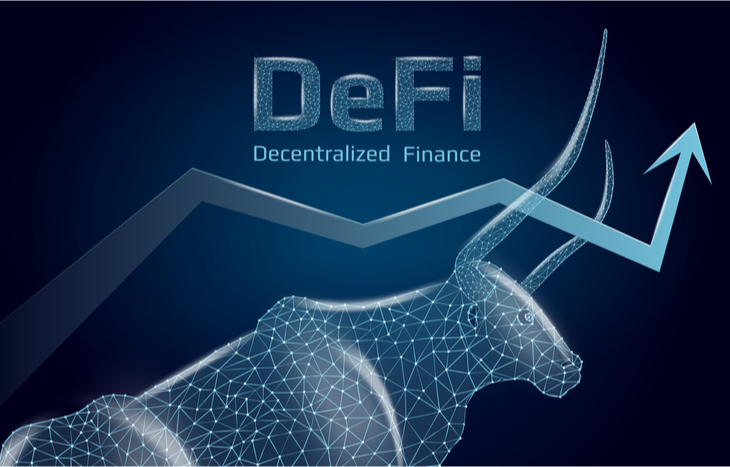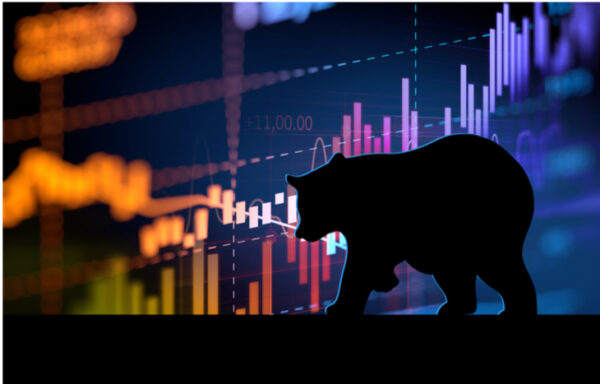How Can I Invest in DeFi Stocks?
The process of going public usually requires the help of major financial institutions. In a sense, this kind of goes against what DeFi companies stand for. This is just one reason why it’s so hard to find DeFi stocks. Luckily, there are still a few that we can look at. We’ll examine those in a second. First, let’s take a deeper dive into the main drivers behind decentralized finance.
Decentralized finance (DeFi) is a new style of financial technology that is built on secure ledgers. It uses the same technology that cryptocurrencies use. However, DeFi goes one step further than crypto. For example, cryptocurrencies are really just tokens that represent value. DeFi allows for things like contracts, apps, services and much more. Cryptocurrencies are part of the DeFi umbrella.
The main purpose of DeFi is to take control back from major financial institutions. But why is this necessary at all?

What’s Wrong With Our Current System?
Our existing financial system is an oligopoly. This means it’s dominated by a handful of major companies. The “Big 4” U.S. banks are JPMorgan Chase, Bank of America, Wells Fargo and Citi. Together, they control nearly half of U.S. retail deposits (approx $4.6 trillion). This oligopoly is the result of decades of mergers & acquisitions. In the 1990s, consumers could pick from about 40 major banks. Today, they can pick from four.
In general, fewer companies means less competition. Less competition leads to higher prices and less value for consumers. Accordingly, today’s financial world is designed to maximize profit for banks. It’s not set up to benefit the consumer. Here are just a few examples:
- High fees: Overdraft fees, fees to send money, monthly maintenance fees, ATM fees, insufficient funds fee, fees to close your account, etc.
- Inconvenience: It can take up to five days to send a simple account transfer. You can’t send money over the weekend. It can be difficult to send money overseas.
- Low rates: The average savings account offers about 0.06% in interest. This is laughably low. Especially when you consider the current inflation rate is 7.5%.
- Lack of control: Banks determine who/when/where you can send money.
The consumer isn’t really getting a whole lot from this relationship. Granted, the bank is supposed to keep their money safe. However, as we saw during the 2008 Financial Recession, consumers’ money is never really “safe.”
DeFi addresses a lot of these issues, and below, I address a few of the best DeFi stocks to invest in. Most importantly, DeFi gives consumers another way to handle their money.
What’s The Point Of DeFi?
Instead of a bank, decentralized finance uses a secure ledger to approve transactions. I won’t get into the specifics of how that works here. Just know that it’s a safe way to remove the middleman from financial transactions. This ultimately eliminates the need for banks.
Additionally, DeFi systems give you much more control over your money. You can store it in a digital wallet and access it anywhere there’s Wifi. You can also send money to whomever you’d like in seconds, not days.
At the end of the day, the DeFi movement is about control. In our current system, the bank controls your money. With decentralized finance, you control your money.
So which companies are helping consumers take back control? Let’s take a look at how you can invest in DeFi apps with these four DeFi stocks.
Top DeFi Stocks to Buy Now
No. 4 Coinbase Global Inc (Nasdaq: COIN)
Coinbase is one of the world’s largest cryptocurrency exchanges. There are a few other major exchanges. However, Coinbase is the only one that is publicly traded. By default, this makes it one of the top DeFi stocks to buy. Coinbase’s main platform lets users easily buy/sell crypto. However, it also has plans to launch an NFT marketplace.
The potential for Coinbase’s business is massive. In some ways, it feels like cryptocurrency has already reached the mainstream. However, this really isn’t the case. According to Pew Research, just 16% of Americans have invested or traded cryptocurrency. Even less have bought NFTs or used other DeFi services. We are still very much at the beginning of this transition to DeFi.
Coinbase is also growing at an insane rate. For FY2021, it reported annual revenue of $7.84 billion. This was up 514% YoY. Even better, it reported a net income of $3.62 billion. This was up a whopping 1,000% YoY. It’s rare for public companies as young as Coinbase to be this profitable.
Additionally, as I write this, Coinbase trades at a P/E ratio of just 17. This is on par with a massive value stock like Disney or Coca-Cola. In fact, it’s lower than both of these companies. This is a little insane for one of the biggest growth DeFi stocks out there.
No. 3 Robinhood Markets Inc (Nasdaq: HOOD)
Robinhood is most well-known for its easy-to-use stock trading platform. However, it also gives users the ability to buy and sell popular cryptocurrencies. Crypto is more of a side hustle for Robinhood and it doesn’t offer very many coins. However, it has stated that it plans to add more. For example, Shiba Inu, the popular meme-Coin should be listed soon.
One major difference between Coinbase and Robinhood is that Robinhood is not yet profitable. It reported a total loss of $3.69 billion for FY2021. This was on an annual revenue of $1.82 billion.
Keep reading for more information on DeFi stocks.
No. 2 Riot Blockchain Inc (Nasdaq: RIOT)
Riot Blockchain is a U.S.-based Bitcoin mining company. If you’re not familiar, Bitcoin mining is the process of verifying new Bitcoin transactions. When you think of a typical miner, you envision someone digging for gold/jewels. A miner is rewarded for their hard work by finding a piece of gold. For Bitcoin miners, instead of digging, they verify transactions. This helps make sure that every Bitcoin transaction is legitimate. And, instead of gold, they are paid in Bitcoin. Riot Blockchain does this at scale.
Just like Coinbase, Riot’s revenue is growing exponentially. In the first three quarters of 2021, its revenue jumped 872%, 1,668%, and 2,500%. However, its total Q32021 revenue was still only $64.81 million. This could mean that Riot still has lots of room to grow.
DeFi Stocks No. 1 Block Inc (NYSE: SQ)
Block Inc is best known for its point-of-sale checkout systems. It also owns the popular money-sending app Cash App. After a recent update, Cash App expanded to allow users to buy and sell bitcoin easily. This essentially makes Block another publicly-traded cryptocurrency exchange.
The biggest reason that Block is one of the top DeFi stocks is its name. It used to be called Square but was recently rebranded to Block. Just like Facebook/Meta, this was done to emphasize a change in its business. Moving forward, Block Inc will be expanding its Defi offerings. However, also like meta, it’s a little unclear what these will be. There is a lot going on under the hood but few of these projects have been widely publicized.
It’s also notable that Block Inc is run by CEO Jack Dorsey. Dorsey is the founder and former CEO of Twitter. He recently stepped down to focus on Block Inc instead. When doing so, he stated, “there is nothing more important in my life to work on right now.”
Should You Invest in DeFi Stocks?
The future for most defi stocks is incredibly bright. However, this is mainly just due to the industry. It’s not an understatement to say that DeFi could change the way the world works. For this reason, it’s worth considering adding a few DeFi stocks to your portfolio.
With that said, it’s highly unlikely that every single DeFi company will stand the test of time. The current environment feels a little similar to the 2001 Dot Com Era. New technology is creating an exciting new market. In 2001, it was clear the internet was here to stay. However, only a fraction of internet companies from the 2000s are still around. DeFi could be the same way. There are hundreds, if not thousands, of exciting companies and projects. However, many of these companies will go bust. Ultimately, only a handful will end up making it in the long run.
Keep this in mind when deciding whether or not to invest in DeFi stocks! I hope that you’ve found this article valuable! As usual, please base all investment decisions on your own risk tolerance and research.
[adzerk-get-ad zone="245143" size="4"]About Teddy Stavetski
A University of Miami grad, Teddy studied marketing and finance while also playing four years on the football team. He’s always had a passion for business and used his experience from a few personal projects to become one of the top-rated business writers on Fiverr.com. When he’s not hammering words onto paper, you can find him hammering notes on the piano or traveling to some place random.





